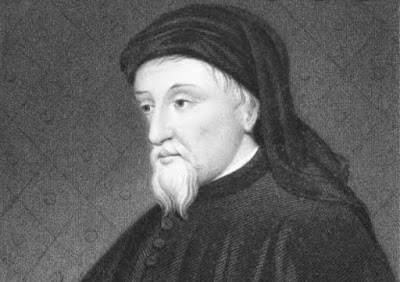Chaucer's Career
Geoffrey Chaucer ( 1340-1400) was an English poet and renowned author. Widely considered the greatest English poet of the Middle Ages, he is best known for his work The Canterbury Tales. He has been called the "father of English literature", or, alternatively, the "father of English poetry".He was the first writer to be buried in what has since come to be called Poets' Corner, in Westminster Abbey. Chaucer also gained fame as a philosopher and astronomer. He maintained a career in the civil service as a bureaucrat, courtier, diplomat, and member of parliament.Among Chaucer's many other works are The Book of the Duchess, The House of Fame, The Legend of Good Women, and Troilus and Criseyde. He is seen as crucial in legitimising the literary use of Middle English when the dominant literary languages in England were still French and Latin.
While records concerning the lives of his contemporaries, William Langland and the Pearl Poets are practically non-existent, since Chaucer was a public servant, his official life is very well documented with nearly five hundred written items testifying to his career. The very first "Chaucer Life Records" appears in 1357, in the household accounts of Elizabeth de Burgh, the Countess of Ulster, when he became the noblewoman's page through his father's connections, a common medieval form of apprenticeship for boys into knighthood or prestige appointments. The countess was married to Lionel, Duke of Clarence, the second surviving son of the king, Edward III, and the position brought the teenage Chaucer into the close court circle, where he was to remain for the rest of his life. He also worked as a courtier, a diplomat, and a civil servant, as well as working for the king from 1389 to 1391 as Clerk of the King's Works.
In 1359, the early stages of the Hundred Years' War, Edward III invaded France and Chaucer travelled with Lionel of Antwerp, 1st Duke of Clarence, Elizabeth's husband, as part of the English army. In 1360, he was captured during the siege of Rheims. Edward paid £16 for his ransom,a considerable sum equivalent to £11,610 in 2019, and Chaucer was released.
Chaucer crest A unicorn's head with canting arms of Roet below: Gules, three Catherine Wheels or (French rouet = "spinning wheel"). Ewelme Church, Oxfordshire. Possibly funeral helm of his son Thomas Chaucer
After this, Chaucer's life is uncertain, but he seems to have travelled in France, Spain, and Flanders, possibly as a messenger and perhaps even going on a pilgrimage to Santiago de Compostela. Around 1366, Chaucer married Philippa (de) Roet. She was a lady-in-waiting to Edward III's queen, Philippa of Hainault, and a sister of Katherine Swynford, who later (c. 1396) became the third wife of John of Gaunt. It is uncertain how many children Chaucer and Philippa had, but three or four are most commonly cited. His son, Thomas Chaucer, had an illustrious career, as chief butler to four kings, envoy to France, and Speaker of the House of Commons. Thomas's daughter, Alice, married the Duke of Suffolk. Thomas's great-grandson (Geoffrey's great-great-grandson), John de la Pole, Earl of Lincoln, was the heir to the throne designated by Richard III before he was deposed. Geoffrey's other children probably included Elizabeth Chaucy, a nun at Barking Abbey,Agnes, an attendant at Henry IV's coronation; and another son, Lewis Chaucer. Chaucer's "Treatise on the Astrolabe" was written for Lewis.
Chaucer studied law in the Inner Temple (an Inn of Court) at this time. He became a member of the royal court of Edward III as a valet de chambre, yeoman, or esquire on 20 June 1367, a position which could entail a wide variety of tasks. His wife also received a pension for court employment. He travelled abroad many times, at least some of them in his role as a valet. In 1368, he may have attended the wedding of Lionel of Antwerp to Violante Visconti, daughter of Galeazzo II Visconti, in Milan. Two other literary stars of the era were in attendance: Jean Froissart and Petrarch. Around this time, Chaucer is believed to have written The Book of the Duchess in honour of Blanche of Lancaster, the late wife of John of Gaunt, who died in 1369 of the plague.
Chaucer travelled to Picardy the next year as part of a military expedition; in 1373 he visited Genoa and Florence. Numerous scholars such as Skeat, Boitani, and Rowland suggested that, on this Italian trip, he came into contact with Petrarch or Boccaccio. They introduced him to medieval Italian poetry, the forms and stories of which he would use later.The purposes of a voyage in 1377 are mysterious, as details within the historical record conflict. Later documents suggest it was a mission, along with Jean Froissart, to arrange a marriage between the future King Richard II and a French princess, thereby ending the Hundred Years War. If this was the purpose of their trip, they seem to have been unsuccessful, as no wedding occurred.
In 1378, Richard II sent Chaucer as an envoy (secret dispatch) to the Visconti and to Sir John Hawkwood, English condottiere (mercenary leader) in Milan. It has been speculated that it was Hawkwood on whom Chaucer based his character the Knight in the Canterbury Tales, for a description matches that of a 14th-century condottiere.
A possible indication that his career as a writer was appreciated came when Edward III granted Chaucer "a gallon of wine daily for the rest of his life" for some unspecified task. This was an unusual grant, but given on a day of celebration, St George's Day, 1374, when artistic endeavours were traditionally rewarded, it is assumed to have been another early poetic work. It is not known which, if any, of Chaucer's extant works prompted the reward, but the suggestion of him as poet to a king places him as a precursor to later poets laureate. Chaucer continued to collect the liquid stipend until Richard II came to power, after which it was converted to a monetary grant on 18 April 1378.
Chaucer obtained the very substantial job of comptroller of the customs for the port of London, which he began on 8 June 1374. He must have been suited for the role as he continued in it for twelve years, a long time in such a post at that time. His life goes undocumented for much of the next ten years, but it is believed that he wrote (or began) most of his famous works during this period. He was mentioned in law papers of 4 May 1380, involved in the raptus (rape or seizure) of Cecilia Chaumpaigne. What was meant is unclear, but the incident seems to have been resolved quickly with an exchange of money in June 1380 and did not leave a stain on Chaucer's reputation. It is not known if Chaucer was in the City of London at the time of the Peasants' Revolt, but if he was, he would have seen its leaders pass almost directly under his apartment window at Aldgate.
While still working as comptroller, Chaucer appears to have moved to Kent, being appointed as one of the commissioners of peace for Kent, at a time when French invasion was a possibility. He is thought to have started work on The Canterbury Tales in the early 1380s. He also became a member of parliament for Kent in 1386 and attended the 'Wonderful Parliament' that year. He appears to have been present at most of the 71 days it sat, for which he was paid £24 9s. On 15 October that year, he gave a deposition in the case of Scrope v. Grosvenor.There is no further reference after this date to Philippa, Chaucer's wife, and she is presumed to have died in 1387. He survived the political upheavals caused by the Lords Appellants, despite the fact that Chaucer knew some of the men executed over the affair quite well.On 12 July 1389, Chaucer was appointed the clerk of the king's works, a sort of foreman organising most of the king's building projects. No major works were begun during his tenure, but he did conduct repairs on Westminster Palace, St. George's Chapel, Windsor, continue building the wharf at the Tower of London and build the stands for a tournament held in 1390. It may have been a difficult job but it paid well: two shillings a day more than three times his salary as a comptroller. Chaucer was also appointed keeper of the lodge at the King's park in Feckenham which was a largely honorary appointment. Chaucer proved himself as a competent appointee.


Comments
Post a Comment